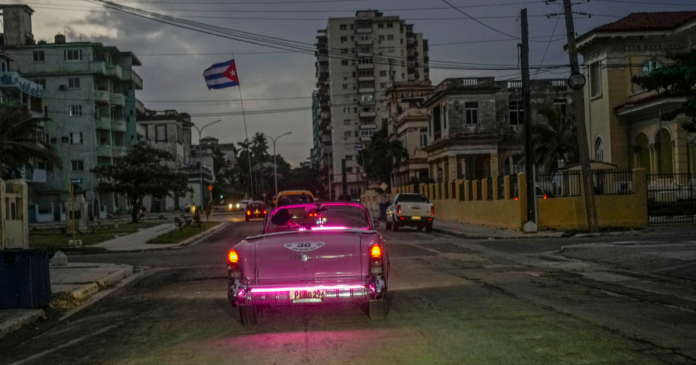As Cuba has grappled with electricity failures and natural disasters, Americans with family on the island and tourists considering visiting have been mobilizing to provide much-needed aid. For both groups, the situation has been cause for worry, extra precautions and planning.
In the past few weeks, Cuba has struggled with nationwide blackouts, two major hurricanes and a 6.8 magnitude earthquake — blows to an already weakened infrastructure. Residents have been left without power for hours a day, and access to food, medicine, water and fuel — already scarce — has become even more of a challenge.
Now, just about a month after the initial grid collapse, both tourists and family members are channeling their frustration and concern into action — sending supplies from both overseas and in person.
A street is lit by car lights during the third night of a nationwide blackout in Havana on Oct. 20, 2024. Adalbero Roque / AFP / Getty Images
Marisa Diaz, a Cuban American content creator, and her husband, Yoel, are a primary provider of aid to their family in Cuba, and during the first round of blackouts weeks ago, their family struggled to preserve food and medicine without any power.
“Electricity blackouts are certainly not uncommon in Cuba,” said Diaz, who’s based in Phoenix; her family lost power for up to eight hours a day following the power collapse. “It’s just to the degree that it was at this point.”
Though the couple regularly pay for cellular data for their family to prevent communication losses during regular, shorter power outages, recent packages to the island have included nonperishables like coffee, instant noodles, dried seasonings, powdered milk, first-aid items like ibuprofen and bandages, and solar-paneled flashlights and phone chargers.
“It’s really hard for Americans to try to understand the quality of life in Cuba,” she said. “There’s so much scarcity.”
“I think all of that has a negative effect on the tourism sector of Cuba,” added Diaz, who’s critical of the country’s government. “Americans are reminded that, yes, there is a dictatorship in Cuba. Yes, Cuba is a communist country.”
Stephanie Herchak, from Orr Lake, Canada and a frequent visitor to Cuba, recently returned from a trip despite travel advisories against going from Canada, the United States and the United Kingdom, citing shortages, the effects of the storms and increased crime.
Aware of the increasingly dire conditions, Herchak brought food and sanitary items to hand out to locals, though she didn’t stray far from the resort where she was staying with her partner.
“All the houses and things that we’ve driven by are just shambles with no windows or anything, people with no power,” she said.
Herchak, who stayed at the Sanctuary by Grand Memories in Santa Maria, said she didn’t experience power outages at the resort while she was there. In a phone call with NBC News, resort staff confirmed they have not had blackouts and use their “own generators.”
But Herchak said she heard from many locals and hotel staff she spoke with that power was still out for hours at a time in residential areas.
Reddit pages and several Facebook Cuba travel groups have become home to conversations on the situation in Cuba; some share concerns regarding upcoming trips and others share rare glimpses into current conditions, even encouraging visitors to reconsider their vacation. Many ask for advice on which goods are most needed by locals.
Cuba’s energy grid suffered a complete blackout after Hurricane Rafael made landfall. Norlys Perez / Reuters
“Over the last few years, more and more people who are going to Cuba are looking for ways to help,” said Rebecca Shoval, program director for Not Just Tourists New York City, a volunteer effort that has connected underserved countries with hard to find resources for over 30 years. This year, they’ve sent a



